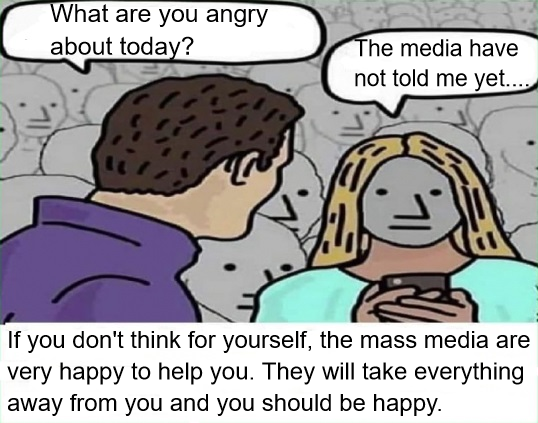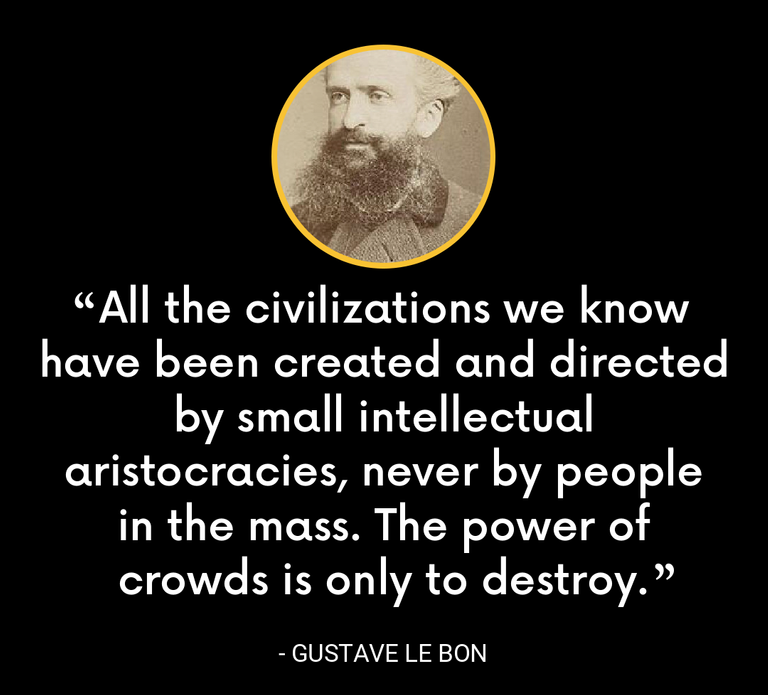The devastating effects of the mass age on our culture.

For the Spanish philosopher José Ortega, it is of no small importance that someone is not only a mass person when one is in the mass and appears there, but can also already be a mass person as an individual. If someone thinks, feels and acts like the masses, if one does not detach oneself from the seductive power of the group, if one does not question one's mass taste, one's mass opinion, if someone identifies himself with the average and mediocrity and does not feel any urge to achieve something special, then soe in person is a mass person!
One of the typical characteristics of such mass people is they do not know any ideals and therefore do not have the feeling to serve this ideal out of an inner necessity. This birth of the mass man, which has strongly marked the last century and its history (keyword: National Socialism, communism, world wars), result in the emergence of the masses as a social phenomenon, which then seize power. The masses have become visible, they want to be recognized, they want what previously only the aristocracy was allowed to do. In all of this, the term "mass" in Ortega's work is not tied to a particular social class, such as the rabble, the common people, as one might first think, but there is also the mass of Porsche drivers, lawyers, newspaper readers, moviegoers and consumers, and so on.
The mass human being can be found in all social strata, but loses his individual and unique identity in the organism of the mass of which he becomes a part, so that, for example, an emotionalized mass of academics, in whom, according to Le Bon, instincts have triumphed over reason, cannot be significantly distinguished from a mass of emotionalized school dropouts and illiterates. Only the detachment from the mass lets people find back to their individual self-determination and uniqueness, so that differences between the said academics and school dropouts become visible again, which were temporarily dissolved before in the unity of the masses controlled by demagogues and mass media.

The seizure of power by the masses means they impose their tastes and desires on society! Mass taste and mass desires prevail, what the mass wants becomes the official Alpha & Omega in our societies. If you consume mass media, you see the default of what people have to believe, think and feel. If you then go to the stores, which unconditionally conform to the prevailing narrative, you quickly see what the rule of a controlled collective looks like, in which newly introduced norms, however bizarre they may be, suddenly become "ordinary".
Ortega even writes the ordinary soul has the audacity to stand up for the right to ordinariness and enforce it everywhere. There is a right to ordinariness in pop culture, trivial culture, mass culture, and so on, a cheapening and trivialization of culture. The authentic work of art, for example, is being replaced by the caricature for bad taste by the quickly reproducible.
Walter Benjamin spoke a few years later about the work of art losing its aura as soon as it becomes possible to reproduce it on a mass scale. It is no longer something special, nothing unique, and then, of course, thinking also becomes "ordinary", it becomes "mass thinking", a prefabricated "mass opinion", spread and reproduced by the mass media, which replaces independent original thinking and no longer allows it!

In the mass society there is only one legitimate attitude and that is the mass opinion! Individuals who do not let themselves be assimilated and dare to deviate from the given opinion, who does not think like all, flees or is eliminated sooner or later in such a more and more radical authoritarian system. The mass cannot stand outsiders, it is the essence of the uniform mass to destroy personality, talent and other deviations of the collective based on egalitarianism.
The sovereignty of the individual is threatened, if not swept away, by the incursion of the multitude of the collective body within him. Ortega writes: "To be different is indecent! The mass destroys everything that is different, that is excellent, personally gifted and exquisite. Whoever is not like everyone, whoever does not think like everyone, runs the risk of being eliminated." We see the background of Ortega's analysis of the mass is always the defense of the individual against the domination of the mass.
On the one hand, the rise of European civilization has a very pleasant side, namely the unprecedented increase of life through freedom, individualism and prosperity. On the other hand, however, it brings with it the moral degeneration of mankind through mass culture. The mass wants to make everything equal to each other, everything must be merged into a collective being, the individual must give up his sovereign individuality and he must become part of the assimilated community, nothing more than a part of the collective, which immediately regards him as an enemy if he remains true to himself, does not allow himself to be assimilated and refuses unconditional loyalty to the line.

The mass is therefore the totality of end-individualized mass people who cannot think for themselves and who want to suppress and assimilate all free-thinking individuals. Gustave Le Bon and also Sigmund Freud have already shown in this context how seductive this can be for people. To finally be absorbed into the masses, to finally no longer be responsible alone, to never again be alone, all this appeals to an original instinct in man, because after all we come historically out of the masses, out of the masses of the group, the clan, so to speak, and whoever thinks and acts like them, just feels lifted up.
Historically, those who have learned to feel safe in groups and not to rebel against the majority opinion have had an advantage; as a rule, they were rewarded for it and their genes were allowed to be passed on through reproduction. So it is obvious why we are so susceptible to the temptations of the masses and also so susceptible to surrendering our maturity or not developing it in the first place. Being immature is our condition for participation in an increasingly communist collective society! The question that arises is, why has the whole thing become worse lately, if this disposition to groupthink is part of our nature? Actually, this should not be a new phenomenon.
Ortega says that the answer to this question can be found in our "sense of entitlement" in the modern age. Our forefathers and mothers still had to work hard for everything, build up prosperity, defend freedom and so on, nothing was self-evident, while all this has virtually fallen into the lap of today's generations, especially in the Western affluent society, and is taken for granted by many people (not all!), which has as a consequence a decadent and "ideology"-infested culture, which after its heyday is heading for the abyss, as many cultures in history have done before.

Average people believe the artificially created world into which they were born maintains itself, even if the opposite is the case. Culture and civilization need the care, otherwise they perish! Previous generations still had to fight for their prerogatives, but the general mass people were simply given the general human and civil rights and so these people also grew up with this conviction. Here we see the cause why mass man runs around in the world with such an attitude of entitlement.
"I have a right to food, I have a right to care, to education, to public swimming pools, a right to good entertainment, to protection, to an unconditional basic income, and if they don't provide me with that all around, I'll scream loudly that it's my basic right to get all that, so provide it!"
The average person does not ask himself what he can contribute to create all this, he does nothing, but is self-satisfied and proud. Ortega says that instead of accepting with humility one's own limitations, mass people loudly advocate ideas that are nothing more than a collection of commonplaces, whether in culture or politics. They have an opinion on everything, without being able to refer to any higher norms or basic truths. But where norms are missing, there is no culture, and cultures in which morals, norms and real values are lost therefore have no future and dissolve, as is clearly visible in the "age of the masses".

Den Text kenn ich doch bereits..
Gut möglich, da Ortega nach meinem Kenntnisstand im deutsch- und englischsprachigen Raum öfter zitiert wird, ebenso Le Bon, der vor allem unter Menschen, die sich jenseits des Mainstreams bewegen meist einen gewissen Bekanntheitsgrad genießt.
@tipu curate
Upvoted 👌 (Mana: 21/41) Liquid rewards.